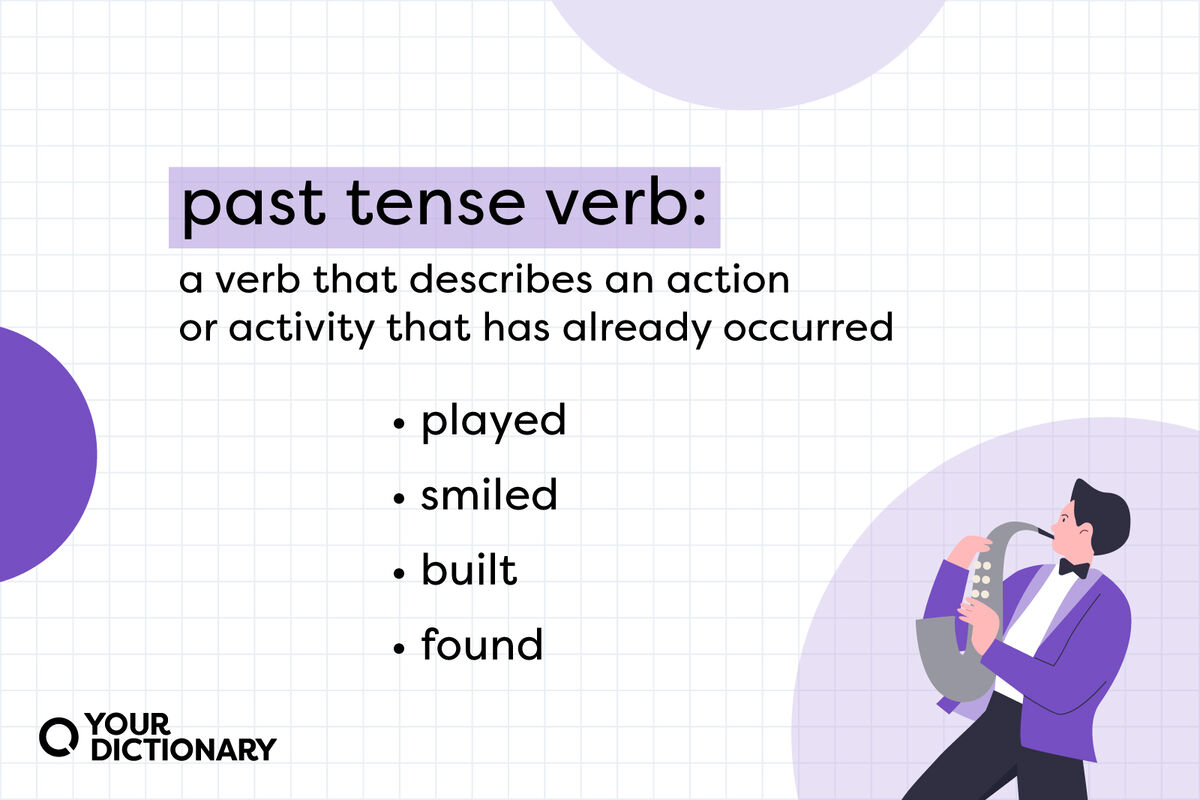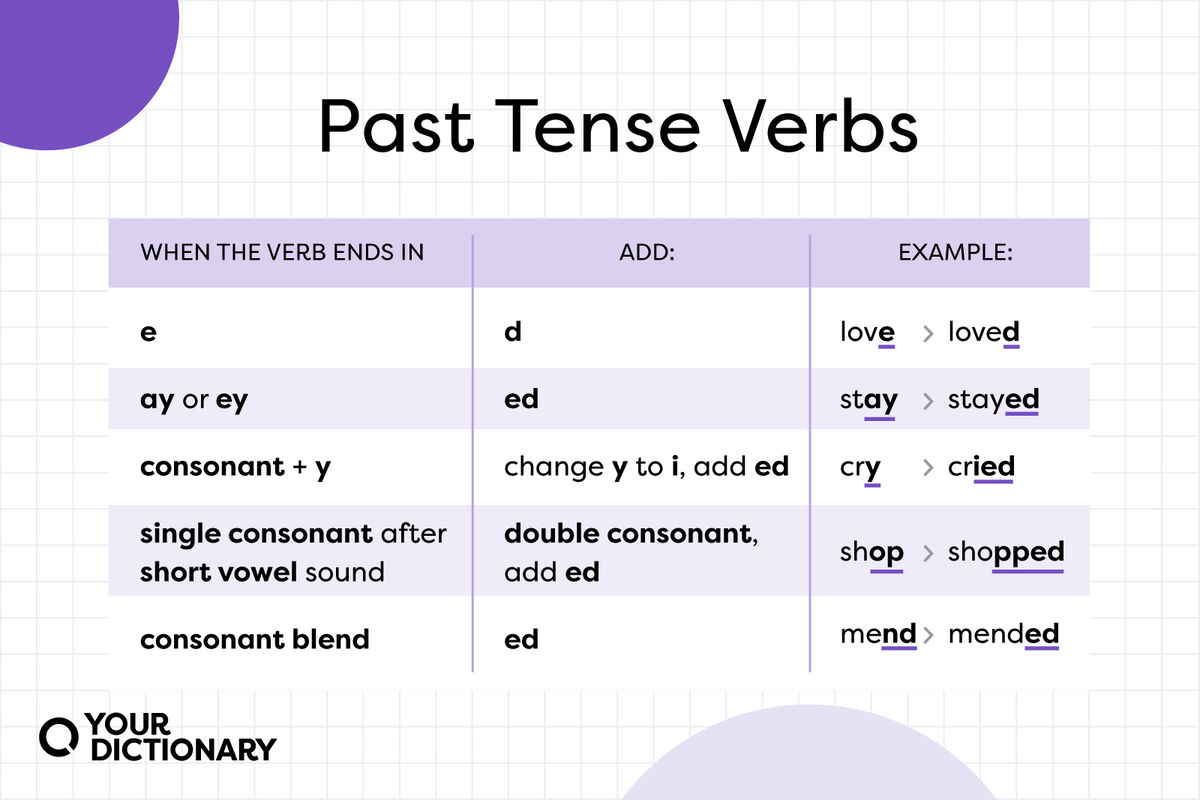
Unless you’ve got a time machine, you’ve probably never visited the past. (That’s probably a good thing — who needs another look at the fashions of yesterday?) But as many writers and English teachers know, you don’t need a fancy invention for a blast from the past. All you need are some past tense verbs to show what happened before today.
What Are Past Tense Verbs?
Past tense verbs describe actions and activities that have already occurred. They could have happened yesterday, a year ago, or a century ago — the tense would be the same.
- We found a time machine.
- It was buzzing outside our house.
- Soon, a time traveler stepped out.
- He marveled at our futuristic world.
- We said goodbye and watched the time machine disappear.
Past tense is one of the three main verb tenses. Present tense describes something that is happening right now, while future tense adds the word will to show that something will happen in the future.
Regular Verbs vs. Irregular Verbs in Past Tense
You can divide verbs into two categories: regular verbs and irregular verbs.
Regular verbs add -ed or -d to their endings in the past tense; otherwise, their spelling doesn’t change.
Examples of regular past tense verbs include:
- asked
- baked
- listened
- played
- smiled
- talked
- walked
- wished
Irregular verbs change their spelling when you put them in the simple past tense. They might also end in -ed or -d, but at least one of their other letters changes between present and past tense as well.
For example:
- became (from become)
- built (from build)
- had (from have)
- found (from find)
- left (from leave)
- saw (from see)
- slept (from sleep)
- was (from is)
Types of Past Tense Verbs
Just like in time travel, exploring the past in grammar isn’t as straightforward as it looks. There are four different past tense forms for you to master, depending on when the action happened and whether it was happening for a while.
- simple past tense
- past progressive tense
- past perfect tense
- past perfect progressive tense
How To Form Simple Past Tense With Regular Verbs
Simple past tense for regular verbs is — well, simple. Just add -ed (or -d if the verb already ends in an -e) and don’t change anything else to show that something happened at a specific point in time.
- I fished all afternoon.
- Mark worked until 3:00.
- The kids bathed after playing in the mud.
The exception to this rule is one-syllable verbs that end in one consonant after a vowel (such as swim or pop). These words double their last consonant before adding -ed.
- Bailey tagged me in her post.
(from the verb tag) - Mike batted the fly away.
(from the verb bat) - The teacher pinned the medal to my shirt.
(from the verb pin)
How To Form Simple Past Tense With Irregular Verbs
For irregular verbs, you need to know their proper past tense form to form them correctly.
- The class partied on Friday.
(Party changes spelling to partied) - My father spoke to the neighbor.
(Speak changes spelling to spoke) - The dogs fought over the bone.
(Fight changes spelling to fought)
How To Form Past Progressive Tense
Past progressive tense, also called past continuous, shows an action that was ongoing or happening for a period of time, but is now over. It usually indicates a longer (and less specific) time period than simple past tense.
For most verbs (both regular and irregular), you form this tense with the helping verb was or were, depending on subject-verb agreement, and adding -ing to the main verb.
- Lara was helping me with my homework.
- My sister was copying every word I said.
- James was attending Brown University.
Just like in simple past tense, one-syllable verbs that end in a consonant-vowel combination double their last letter before adding -ing. If a verb ends in -e, you drop that letter before adding -ing.
- Mom was swimming at the pool across town.
(from the verb swim) - The student was popping his gum during class.
(from the verb pop) - Cory was smiling from ear to ear.
(from the verb smile)
How To Form Past Perfect Tense
Verbs in past perfect tense (sometimes called pluperfect) show an action that happened before another action. The past perfect tense uses a verb’s past participle and the helping verb had.
- My family had moved to New York.
- Frances had graduated from high school.
- She had wished for a miracle.
Irregular verbs often have different past participle forms than their simple past forms. For example, swim becomes swam in past tense (I swam ten laps), but its past participle is swum in past perfect (I had swum ten laps).
- I had drunk four bottles of water.
(from the verb drink/drank) - The boat had sunk before help could arrive.
(from the verb sink/sank) - Joanna had sung in public several times before.
(from the verb sing/sang)
How To Form Past Perfect Progressive Tense
When you combine past perfect and past progressive tenses, you get past perfect progressive tense — when a continuous action used to happen, but doesn’t anymore. Add helping verbs had and been to the main verb, as well as the ending -ing.
- Bianca had been listening the whole time.
- My brothers had been doing chores all day.
- Miles had been sleeping when the rooster crowed.
Just like in past progressive tense, you double the last consonant of a one-syllable verb or drop the ending -e of a verb before adding -ing.
- My grandmother had been getting ready for church.
(from the verb get) - I had been planning on buying my first car.
(from the verb plan) - The teacher had been grading tests before the assembly began.
(from the verb grade)

How Do You Make Past Tense Verbs Negative?
Saying that something did happen in the past is one thing, but what if it didn’t? In those cases, you add the negative helping verbs didn’t, doesn’t, hadn’t, haven’t, or hasn’t before the verb.
- Simple past tense: “It rained” becomes “It didn’t rain.”
- Past progressive: “It was raining” becomes “It wasn’t raining.”
- Past perfect: “It had rained” becomes “It hadn’t rained.”
- Past perfect progressive: “It had been raining” becomes “It hadn’t been raining.”
Notice that you drop the -ed in simple past tense, but you keep the -ed ending in past perfect (and the -ing in past progressive and past present progressive) when you make the sentence negative.
Past Tense Verbs in Questions
Unlike many other languages, especially Romance languages, English does not have separate imperative or interrogative verb forms. Instead, you change statements to questions with changes in word order and punctuation.
- Simple past tense: "She walked" becomes "Did she walk?"
- Past progressive: "She was walking" becomes "Was she walking?"
- Past perfect: "She had walked" becomes "Had she walked?"
- Past perfect progressive: "She had been walking" becomes "Had she been walking?"
Like above, you drop the -ed in simple past tense and keep the -ed ending in past perfect, as well as the -ing in past progressive and past present progressive.
Past Tense Verb Quiz
Can you tell which form of the past tense each verb is in? (Hint: Look out for those helping verbs.)
- He had warned me from the beginning.
- I rubbed the dog’s belly.
- Nina had met her husband only a month before marrying him.
- Isaiah didn’t want you to know about the car.
- We had been working on this project for nearly a year.
Answer Key for Past Tense Verb Quiz
Did you identify each form of the past tense verbs?
- He had warned me from the beginning. (Past perfect)
- I rubbed the dog’s belly. (Simple past)
- Nina had met her husband only a month before marrying him. (Past perfect)
- Isaiah didn’t want you to know about the car. (Simple past)
- We had been working on this project for nearly a year. (Past perfect progressive)